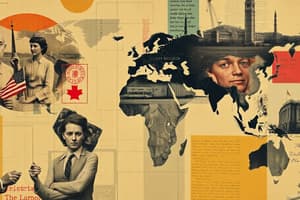Podcast
Questions and Answers
What is the common confusion between globalization and internationalization?
What is the common confusion between globalization and internationalization?
- Globalization is synonymous with cross-border activities.
- Internationalization refers to interactions across national borders.
- Globalization transcends borders, including cultural exchanges.
- Both A and B (correct)
Who is associated with the World Systems Paradigm?
Who is associated with the World Systems Paradigm?
Immanuel Wallerstein
What does the term 'McDonaldization' refer to?
What does the term 'McDonaldization' refer to?
The spread of Western cultural dominance overshadowing local cultures.
What is a key purpose of Bretton Woods Institutions?
What is a key purpose of Bretton Woods Institutions?
Globalization is always associated with neoliberal economic policies.
Globalization is always associated with neoliberal economic policies.
What is the term for an agreement between several countries?
What is the term for an agreement between several countries?
What does protectionism refer to?
What does protectionism refer to?
The process of __________ involves trading goods and services without barriers.
The process of __________ involves trading goods and services without barriers.
Match the following types of mergers:
Match the following types of mergers:
Flashcards are hidden until you start studying
Study Notes
Globalization: A Complex Concept
- Globalization is a multifaceted phenomenon with competing definitions, encompassing processes, conditions, and ideologies.
- Globalization as a process involves the interconnectedness of the world through flows of information, goods, services, people, and capital.
- Globalization as a condition refers to the state of interconnectedness, marked by increasing interdependence and the integration of economies, cultures, and societies.
- Globalization as an ideology relates to the belief in interconnectedness and interdependence as beneficial, often promoting free trade and global governance.
Paradigm Shifts: Understanding Globalization
- The World Systems Paradigm, championed by Immanuel Wallerstein, focuses on the global economic system and its division into core, periphery, and semi-periphery nations.
- The Global Capitalism Paradigm emphasizes the role of capitalism in fostering global interconnectedness and driving economic growth.
- The Network Society School of Thought, led by Manuel Castells, explores the impact of information technology on the creation of a global network society.
- The Space, Time, and Globalization perspective, developed by Anthony Giddens and Saskia Sassen, examines the compression of time and space due to globalization, with emphasis on the rise of global cities.
- Transnationality and Transnationalism focus on the growing interconnectedness of individuals and organizations across national borders, moving beyond traditional boundaries and fostering global cooperation.
- The Global Culture Paradigm explores the convergence of cultures and the spread of globalized cultural products, raising concerns about cultural homogenization and the influence of dominant cultures on others.
Unpacking Misconceptions: Refining Globalization
- Globalization is often confused with internationalization, but globalization transcends national borders, encompassing cultural and social interactions.
- Equating globalization with liberalization, the removal of barriers to create an open global economy, is a limited view, overlooking social and political dimensions.
- The view of globalization as universalization or Westernization, suggesting the spread of Western values and practices, overlooks historical examples of cultural exchange and focuses mainly on cultural dominance.
Measuring Globalization: Indicators of Interconnectedness
- Globalization as interdependence highlights the mutual reliance of nations on each other for resources, markets, and trade.
- Globalization as internationalization involves cross-border interactions between individuals, corporations, and states.
- Globalization as liberalization involves removing barriers to trade and investment, promoting free markets and global economic integration.
- Globalization as universalization suggests the spread of Western culture and values, often accompanied by concerns about homogenization.
Global Economy: Trade, Specialization, and Integration
- The global economy encompasses all economic activities and interactions on a global scale, fostering interdependence among nations.
- The division of labor and specialization drive trade, allowing countries to produce goods and services where they have a comparative advantage.
- Countries trade for various reasons, including obtaining goods and services not available domestically, exploiting comparative advantages, and stimulating economic growth.
- The benefits of trade include increased efficiency, lower prices for consumers, and a wider variety of goods and services.
Trade Theories: Principles Guiding Global Markets
- Absolute advantage refers to a country's ability to produce a good or service with fewer resources than another country.
- Comparative advantage focuses on a country's relative efficiency in producing goods or services, even if it's absolutely less efficient than another country.
- Free trade promotes the idea of removing barriers to trade, allowing countries to specialize and engage in mutually beneficial exchanges.
- Protectionism refers to policies designed to protect domestic industries from foreign competition, often through tariffs, quotas, or other restrictions.
Market Integration: Facilitating Global Trade
- Market integration refers to the process of combining separate markets into a larger one, leading to reduced trade barriers and increased trade flows.
Post-World War II Economic System: Institutions and Governance
- The Bretton Woods Conference in 1944 established a new international economic order with the aim of promoting global economic stability and growth.
- The Bretton Woods institutions, including the International Monetary Fund (IMF), the World Bank (IBRD), and the General Agreement on Tariffs and Trade (GATT), were created to manage and regulate the global economy.
- The IMF focuses on financial stability, providing loans to countries with balance-of-payments problems and promoting international monetary cooperation.
- The World Bank provides loans and grants for development projects in developing countries, focusing on poverty reduction and economic growth.
- GATT, now replaced by the World Trade Organization (WTO), aimed at reducing trade barriers and promoting free trade between member countries.
- Other economic organizations, such as the North American Free Trade Agreement (NAFTA), have emerged to stimulate regional integration and trade liberalization.
- The International Monetary System is a complex system of exchanging currencies and managing international payments.
History of Market Integration: From Unilateral to Multilateral Order
- The Mercantilist Period (17th-18th centuries) focused on national wealth and power, with limited international trade and government intervention.
- Industrialization (19th century) saw a surge in international trade driven by the rise of industrial economies.
- The impact of World War I led to trade disruptions and the rise of protectionist policies.
- The Post-World War II Trade Regime emphasized free trade through GATT, promoting economic recovery and development.
- The World Trade Organization (WTO) succeeded GATT, continuing to promote free trade, enforce trade agreements, and resolve disputes between member countries.
From Keynesianism to Neoliberalism: Shift in Economic Ideology
- Keynesian economics emphasizes government intervention in the economy to stimulate growth and stabilize markets.
- Neoliberalism advocates for minimal government intervention, free markets, and deregulation, shaping global economic policies.
Global Interstate and Governance: Managing Interconnectedness
- Global Interstate refers to the complex interactions between states in the global system, encompassing diplomatic relations, international agreements, and power dynamics.
- Global governance refers to the various mechanisms, institutions, and processes through which international cooperation is pursued in the face of global challenges.
International Cooperation: Addressing Global Issues
- Liberal internationalists believe in a global governance system based on the rule of law, democracy, and human rights.
- Socialist internationalism emphasizes the importance of economic equality and social justice in the global system.
- International agreements, which can be bilateral or multilateral, form the foundation of global cooperation and address common challenges.
Mergers and Acquisitions: Strategies for Growth
- A horizontal merger combines companies with similar products or services.
- A vertical merger consolidates the supply chain for a product, integrating various stages of production.
- A concentric merger brings together companies with different products but similar target audiences.
- A conglomerate merger involves companies in unrelated industries, diversifying their product portfolios and market reach.
Studying That Suits You
Use AI to generate personalized quizzes and flashcards to suit your learning preferences.




